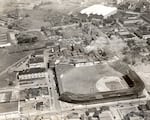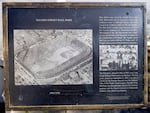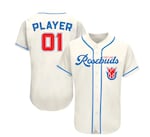If you ever find yourself at Northwest 25th and Vaughn Street in Portland, you might think the area is pretty unassuming at first: there’s a mix of industrial properties, houses and apartments in the neighborhood. Hotels are within view further down the street, and the Adidas store attracts shoppers from around the metro area just a few blocks away.
But at the same spot 75 years ago, Portland’s baseball teams stepped up to the plate at Vaughn Street Park, a 12,000-seat wooden stadium in the Slabtown district. Demolished in 1956 as a fire hazard, what’s left of the park today is a commemorative plaque that name-drops two teams from the annals of Portland’s baseball history, the Portland Webfooters and the Portland Beavers.

Aerial view of the Vaughn Street Park at NW 24th & Vaughn St. near the Electric Steel Foundry, Sept. 23, 1945.
Courtesty of the Oregon Historical Society / OPB
But the plaque doesn’t mention another team that briefly called Vaughn Street home: the 1946 Portland Rosebuds, the city’s first and only Negro League baseball team.
This summer, Portland’s Wild Wild West League is resurrecting the Rosebuds moniker for a brand new team in honor of the original one. But information about the ’46 Rosebuds has been tough for the league to track down.
“It was almost like it was erased from history — it was just gone,” said Alan Miller, co-owner of the Portland Pickles and ‘marshal’ for the Wild Wild West League. “People weren’t, at that time, willing to talk about them. They weren’t willing to cover them. They weren’t willing to support them — and that made it even harder.”
From the few short news articles from the ’40s that can be found, many newspapers called the team by its nickname, the Portland Roses. That name wasn’t unique to baseball — a Portland Rosebuds hockey team preceded them three decades earlier.
“It was almost like it was erased from history — it was just gone. People weren’t, at that time, willing to talk about them. They weren’t willing to cover them. They weren’t willing to support them — and that made it even harder.”
The baseball Rosebuds were part of the West Coast Negro Baseball Association, a Negro minor league with six teams, including the Seattle Steelheads and the Oakland Larks. The Portland team also played at a time when organized baseball was still segregated.
“Baseball is a perfect microcosm of race relations in the United States,” said Chieko Phillips, who serves as the heritage program director at 4Culture, a cultural funding agency in Seattle.
In 2014, Phillips curated an exhibit at Seattle’s Northwest African American Museum titled “Pitch Black,” which focused on African American baseball in Washington state. Phillips said that racist policies in the 1940s made traveling for Black athletes — and any Black American — extremely arduous.
“Before the Civil Rights movement, there were certain hotel rooms that players could and couldn’t stay at. Sometimes players had to sleep on the bus or outside,” Phillips said. “Sometimes folks had to bring food with them because they weren’t sure when they would find restaurants that would allow them to eat.”
Struggle and perseverance
But the story of Negro League baseball is more than just a story of struggle. For Raymond Doswell, vice president and curator of the Negro Leagues Baseball Museum in Kansas City, it’s also a story of perseverance.
“To play baseball under segregation, you really had to love the game to endure so many indignities,” Doswell said.
According to Doswell, Negro League teams were a byproduct of the Great Migration, a period of time between 1916 and 1970 when around 6 million African Americans moved out of the rural South and into cities and urban neighborhoods such as Harlem in New York, Kansas City, Beale Street in Memphis and Chicago.
Many Negro League teams didn’t have the financial stability or support that white teams had, but they still provided opportunities for Black athletes — even outside of baseball. Take, for example, Olympic track and field speedster Jesse Owens, the four-time gold medalist who stunned the world at the 1936 Olympic games in Berlin.
“The Black baseball teams really helped Jesse Owens after the Olympics. He was stripped of his amateur status and could no longer compete in certain events,” Doswell said. “The reasons were basically racism — that he was barred from further competition considering how successful he and his teammates were in Berlin.”
To make a living, Owens partnered with friend and Harlem Globetrotters owner Abe Saperstein to run the West Coast Negro Baseball Association a decade later. Owens went on to become the owner of the Portland Rosebuds and publicized West Coast league games by sprinting against racehorses across baseball fields.
According to Portland Monthly, Owens recruited players from a slew of larger Negro league teams: pitcher Al Jones from the Memphis Red Sox, infielder Collins Jones and first baseman Blue Dunn from the Miami Ethiopian Clowns.

A historical marker at the intersection of NW 25th Ave. and Vaughn St. commemorates the Vaughn Street Ball Park in Portland, March 10, 2021. Left field was near the northeast corner of this location.
Kristyna Wentz-Graff / OPB
But even with Owens’ star power, it ultimately wasn’t enough to keep the West Coast league sustainable. In 1946, the Rosebuds were supposed to play a full season of 110 games — but the league as a whole folded in less than three months, with the Portland Rosebuds ending in mid-July with a 7-8 record.
According to Leslie Heaphy, a Kent State University history professor and Negro Leagues baseball historian, several different factors worked against the West Coast league. Negro league teams had to compete for time in stadiums and parks primarily used by white leagues; the money also ran dry as attendance dwindled. And then there’s the inherent charm of playing baseball in the Pacific Northwest.
“Quite frankly given where they were playing, particularly for Portland and Seattle, there were a number of games that got rained out,” Heaphy said.
The West Coast Negro Baseball Association was also established on the cusp of Jackie Robinson’s historic appearance with the Brooklyn Dodgers in 1947. He broke baseball’s color barrier, integrated into Major League Baseball, and in turn, drew fan attention and press coverage away from the West Coast league.
Recovering an important history
Today, the world knows about Owens and some of the best players to come out of the Negro leagues, yet none of the Rosebuds ended up in the majors. According to Doswell, most of the athletes who played in the Negro Leagues will never get the full credit they deserve — but it’s important to remember their stories.
“I’m pleased that there’s an interest in Portland to support the history of the Rosebuds, and we’re happy to support that where we can. What I hope is that as we mark that past, we’re also remembering the hardships that those players went through and in a way to memorialize their interest in baseball and their perseverance in baseball,” Doswell said.

A new team in the Wild Wild West League has taken on the Portland Rosebuds name, as a nod to the short-lived 1946 team of the same name, which was part of the West Coast Negro League. The 2021 Rosebuds open their inaugural season at Lents Park on June 21st.
Courtesy of the Wild Wild West League
“Hopefully this is a way of continuing to teach the history, not to whitewash the history, and remind people of the contributions of African-Americans to the Portland community and beyond,” he said.
And that’s part of what the Portland Pickles and the Wild Wild West League are trying to do this summer. For co-owner Alan Miller, he hopes to welcome fans back safely with a focus on educating Portlanders about the team’s legacy.
“I think part of having a baseball team in Portland, there’s a certain amount of responsibility that we have to understand the past,” he said. " And if we can show people that, ‘Hey, this happened, this is a really important part of Portland’s history,’ that’s the first step.”
The 2021 Rosebuds open their inaugural season at Lents Park on June 21st, and they’ll be rocking new jerseys with a new Rosebuds logo. They hope to shine a light on an often overlooked, but important chapter of Portland’s storied history with baseball.

